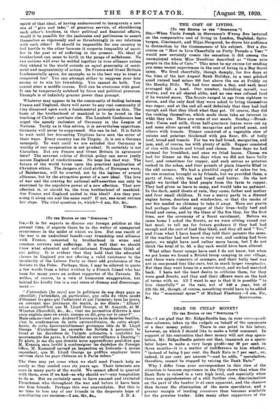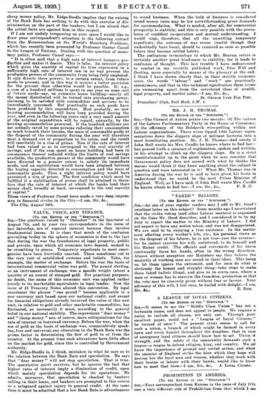DEAR OR CHEAP MONEY?
[To TIM EDITOR or THE " SPECTATOR.") SIR, —I am glad that Mr. Ridge-Beedle has, in your correspund- ewe -columns, taken up the cudgels on behalf of the opponents of a dear money policy. There is •one point in his letter, however, on which I should like to make a brief comment. In support of his contention that dear money will not stop specu- lation, Mr. Ridge-Beadle points out that, inasmuch as a specu- lator hopes to make a very large profit—say 20 per cent. in three months—it is a matter of indifference to him whether, "instead of being 5 per cent. the Bank Rate is 7 per cent., or, indeed, 15 per cent. per annum "—and he adds, " speculation, therefore, cannot be stopped by raising the Bank Rate."
Why I differ from your correspondent in this view of the situation is because experience in the City shows that when the Bank Rate is raised to a very high level, and especially when there are apprehensions of a still further rise, discrimination on the part of the banker is at once apparent, and the chances then favour the elimination of the more speculator, and a greater margin of lending resources then becomes available for the genuine trader. Like many other supporters of the cheap money policy, Mr. Ridge-Beedle implies that the raising of the Bank Rate has nothing to do with this exercise of dis- crimination on the part of the bankers, but I am afraid that the actual facts are against him in this respect. If I am not unduly trespassing on your space I would like to draw your correspondent's attention to the following extract from the Memorandum on the World's Monetary Problemi, which has recently been presented by Professor Gustav Cassel to the League of Nations. Dealing with the question of mone- tary policy, Professor Cassel says :- " It is often said that a high rate of interest hampers pro- auction and makes it dearer. This is false. An interest policy which gives the scarcity of capital its true expression in a sufficiently high rate of interest can in no way prevent the productive powers of the community from being fully employed. It only directs these powers, to a certain extent, from future needs to present, and in this way it secures a better provision for the present than otherwise would be possible. If, e.g., a sum of a hundred millions is spent in one year on some sort of future needs—say, on extensive house building—nearly all the money distributed will be turned into purchasing power, claiming to be satisfied with commodities and services to be immediately consumed. But practically no such goods have been produced by this expenditure. Most probably, no new housing accommodation will have been provided during the year, and even in the following years only a very small amount of the original expenditure will be repaid, annually, by the housing accommodation procured. If the hundred millions are not actually saved by some persons reducing their consumption so much beneath their income, the mass of consumable goods at the disposal of the community during the year will therefore meet a demand out of proportion to its value, and the result will inevitably be a rise of prices. Now if the rate of interest had been raised so as to correspond to the real scarcity of savings, and if the sum spent• on house building had been in consequence thereof reduced within the limits of real savings available, the productive powers of the community would have been directed to a greater extent to satisfy its immediate needs,- and an equilibrium would have been attained between the buying capacity directed to consumption and the mass of consumable goods: Thus a right interest policy would have prevented a rise of prices. The first condition which must be i fulfilled if a stabilization of prices shall be attained is there- fore that the rate of interest at which the banks lend their money shall, broadly at least, correspond to the real scarcity of capital."
These views of Professor Cassel have made a very deep impres- sion in financial circles in the City.—I am, Sir, &c.,



































 Previous page
Previous page